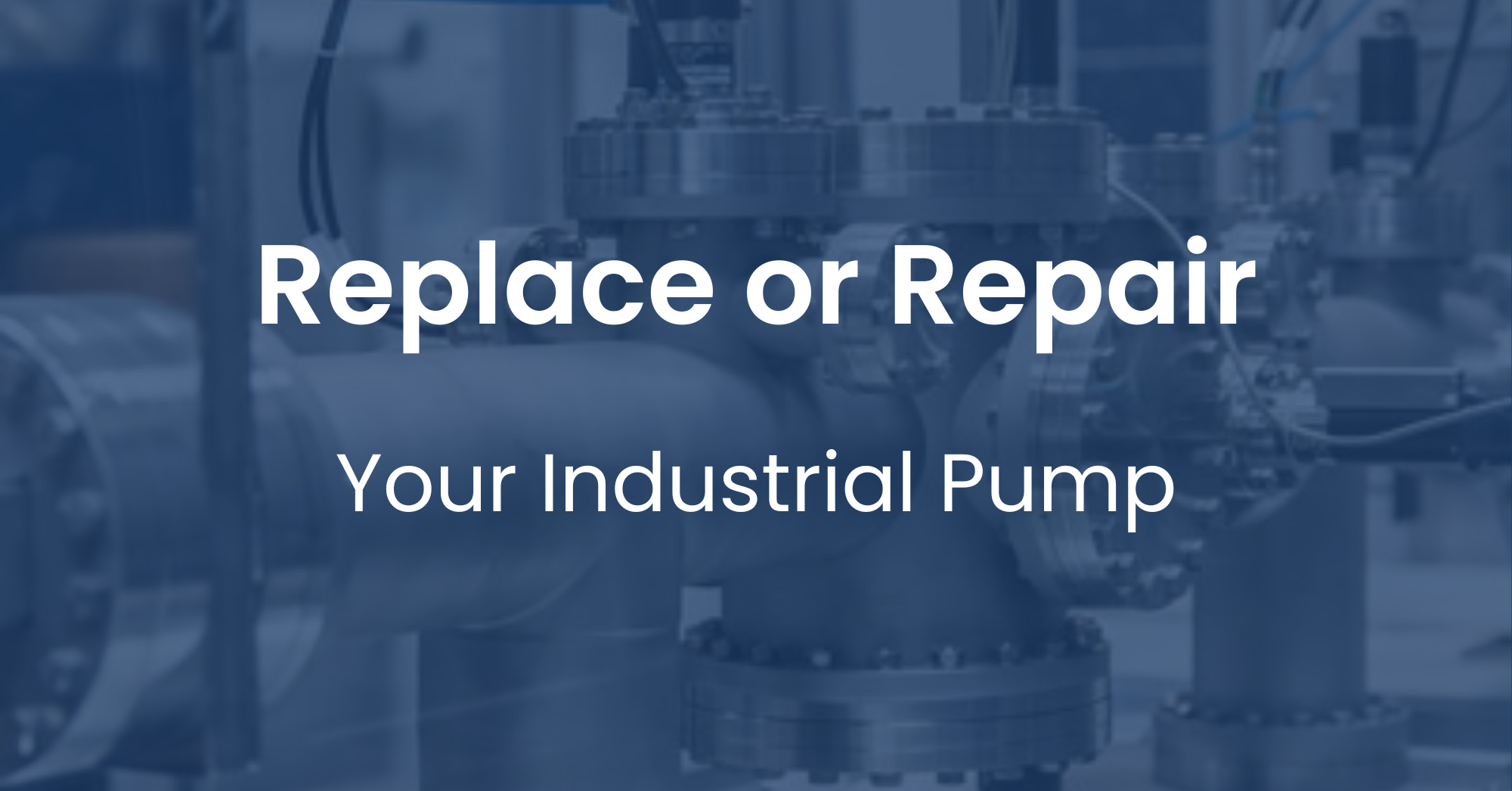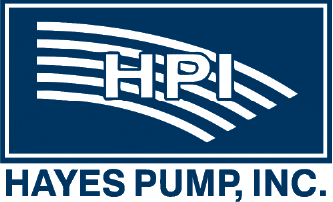Home » Blog » Should You Replace or Repair Your Industrial Pump?
Should You Replace or Repair Your Industrial Pump?

When something breaks down in any industry, inevitably, there will be a discussion on whether to replace or repair it. This is no different for any industrial equipment, including industrial pumps. Their repair or replacement depends on several variables, which should all be logically considered to determine the best course of action. Even if an engineer or mechanic can fix an industrial pump, economics ultimately must be considered in the equation. Though cost is critical, multiple other factors that play into the final cost also require consideration.
Pump Repair or Replacement?
It’s one of the first questions often asked when something goes wrong with a pump. If Hamlet were part of an industrial pump maintenance team, he might ask: “To repair or not to repair, that is the question.” But it goes even deeper than that, and many follow-up questions must be asked to determine the final and best answer for the situation. When something goes wrong with an industrial pump, it’s essential to get answers to a few basic questions first.
A discussion will generally include these or variations of these questions:
- What’s the problem with the industrial pump?
- Can this problem be fixed?
- How much will it cost to fix this problem?
Identifying problems with industrial pump systems tends to be the most difficult, as it often involves more than one issue. This usually requires sufficient experience and knowledge about the pump, along with a bit of intuition and luck. The type of problem will also play into this, and if there’s not a seasoned in-house expert on industrial pump repair, it may be better to outsource the solution to a third-party expert.
Any problem with a pump can be fixed if enough money is thrown at it, but a facility must decide whether it’s more cost-effective to replace or repair an industrial pump. A general guideline is that if pump repair costs exceed half the cost it would take to replace it, the pump should be replaced.
Criteria to Consider When Looking to Repair or Replace Industrial Pumps
Numerous factors should be considered before deciding on whether the expense of an industrial pump repair indicates whether it should be replaced. With many older industrial pump systems, the inefficiency and lack of reliability may point towards pump replacement or the entire system. For other industrial pumps that have run without problems for years, a less-costly repair may be enough to keep them running. To help determine the best course of action, an analysis should be made that looks at the costs inherent in downtime, maintenance, and repairs and add these costs to the replacement cost. For industrial pumps that aren’t breaking down frequently, operate efficiently, and have a history of running reliably, it may be better to have the pump repaired.
Other factors should also be considered before replacing industrial pumps or systems. These might include the space available, costs of reworking the system, regularity of pump failures, and whether a warranty is still in effect. Additionally, production facilities must contemplate whether the downtime and disruption will affect lead times, adding to pump repair or replacement costs. Generally, repairs will be less disruptive than replacing entire industrial pump systems, while in other cases, persistent failures may mean replacement is the better choice.
Several significant considerations include:
Pump Repair or Replacement Costs
Ultimately, everything comes down to the pump repair or replacement price. If a new pump won’t cost too much, it makes sense to replace it. If the repair is a basic bearing and seal replacement, then repair also makes sense.
Disrupting Production
When it comes to industrial use, both pump repair and replacement disrupt production. In many sectors, the cost of downtime is prohibitive. In some cases, facilities even have a backup pump onsite to minimize downtime due to pump repairs.
Generally speaking, stakeholders should:
- Repair the pump if it’s not critical to production or if there’s a backup pump available.
- Replace the pump if it’s critical to production and there’s no backup pump available.
Energy Efficiency
With much attention within the industry these days focusing on energy conservation to limit climate change, the poor energy efficiency of many older pumps is being called into question. The European Union and our DOE have recently focused on the energy efficiency of industrial pump systems, with a minimum hydraulic efficiency index for industrial pumps that all manufacturers must meet. This has resulted in the development of end-suction industrial pumps that are now 13 percent more efficient than older models. Energy savings from modern industrial pump systems should play a part in whether to repair or replace a pump.
Generally speaking, stakeholders should:
- Repair when the industrial pump is already highly efficient and modern.
- Replace when older and inefficient pumping technology is being used.
Facility Age
The dimensions of older facilities and existing industrial pump system configurations will often determine whether pump repair or replacement is preferred. In older facilities, the costs inherent in redoing pipework for a new pump system may require dealing with asbestos or other hazardous substances.
Generally speaking, stakeholders should:
- Repair industrial pump systems in older facilities with archaic layouts, where standards and dimensions would cause undue disruption.
- Replace industrial pump systems in more modern facilities that allow a relatively easy swap.
Availability of Industrial Pump Systems
When sourcing replacement industrial pumps and systems, availability plays a significant role in whether to repair or replace them. For example, smaller 15 to 22-kW industrial pumps can often be shipped from distributors or manufacturers within a few days. However, more specialized industrial pumps for specific applications often require certain options like coatings or impeller sizes. Such specialty industrial pumps aren’t readily available and are generally subject to much longer lead times.
Generally speaking, stakeholders should:
- Repair specialty industrial pumps, particularly those with long production lead times.
- Replace industrial pumps that can be shipped within a short timeframe.
Availability of Replacement Components
Accessing spare parts is essential to any pump repair, and sometimes the lack of availability of specific components will play a role in decisions to replace an industrial pump. Repairing water pumps in HVAC or light industrial applications is less cost-effective than replacing them. Industrial pumps used for processing or wastewater treatment repair are the usual option, with manufacturers providing pump repair kits with some of the key components that typically wear out. However, obsolete technology generally won’t be supported. Though many are still operational, sourcing spare parts for decades-old industrial pumps is difficult, as original equipment manufacturers have stopped making them. Facilities using these older pumps risk their operations should the entire industrial pump system fail.
Generally speaking, stakeholders should:
- Repair when there are readily available spare parts and pump repair kits.
- Replace when parts are too complex to source or if the cost of downtime, labor, and components make pump repair uneconomical.
Seek Advice When Replacing or Repairing Industrial Pumps & Systems
Choosing between pump repair and replacement is often a challenging decision. Costs and disruptions to a facility’s processes occur regardless of the action taken. The best way forward is to seek advice from an expert in industrial pump systems like Hayes Pump. As the largest supplier of commercial, municipal, and industrial pumps in the Northeast, we have the knowledge and experience to assist in decisions surrounding pump repair or replacement. To learn more about how our expert team can support your industrial pump systems, contact Hayes Pump today.




